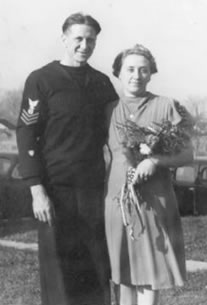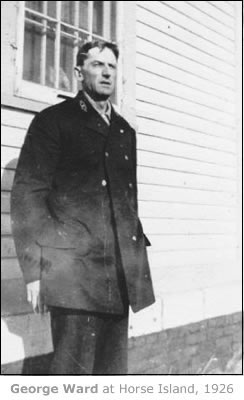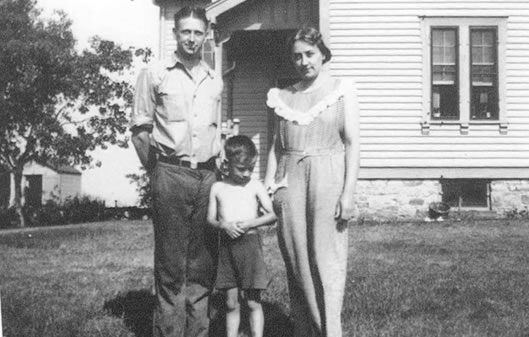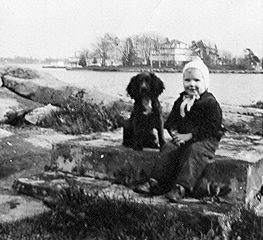 Frank
K. Ward, born in 21 March 1909,
was a son of George
Ward who was a career lighthouse keeper. George's
father, James
Ward was a keeper also, as was George's father-in-law
Horace Holloway.
George served as keeper at Detroit River Light, Crossover Light, Horse
Island Light and Keeper at Oswego Harbor Light. Besides Frank were
his two brothers, Edwin
and Oswald
who also became keepers. Edwin was a career lighthouse keeper stationed
at Tibbits Point Light and at Sodus Point Lights, both on Lake Ontario.
Oswald served at stations at Buffalo and Rochester, NY.
Frank
K. Ward, born in 21 March 1909,
was a son of George
Ward who was a career lighthouse keeper. George's
father, James
Ward was a keeper also, as was George's father-in-law
Horace Holloway.
George served as keeper at Detroit River Light, Crossover Light, Horse
Island Light and Keeper at Oswego Harbor Light. Besides Frank were
his two brothers, Edwin
and Oswald
who also became keepers. Edwin was a career lighthouse keeper stationed
at Tibbits Point Light and at Sodus Point Lights, both on Lake Ontario.
Oswald served at stations at Buffalo and Rochester, NY.
These
men, as well as thousands of others, were dedicated to the U.S. Lighthouse
Service, which existed until 1940. U.S.L.H.S. servicemen served on
both coasts and all the navigable rivers in the country. There also
were floating light houses, called lightships, anchored on the ocean
in locations where land based lights were not effective. At least
one, in the mid 1930's, anchored off the mid-Atlantic coast, was lost
with all hands during a bad storm.
In 1939 with an act of
Congress, the U.S. Coast Guard took over the Lighthouse Service. Frank,
like all the active Keepers, was given the option to enlist in the
Coast Guard or become civilian employees of the Coast Guard. Frank
took the enlistment option in 1940.
 In the spring of 1940,
just before the Coast Guard replaced the Lighthouse Service, Frank,
while keeper at Crossover Light, was appointed keeper at Rock Island
Light. Prior to Crossover, he had served at Lorain, Ohio Harbor Light
as Assistant Keeper and before that he was Assistant Keeper at Cleveland
Light—his first appointment after joining the Service in 1929.
In the spring of 1940,
just before the Coast Guard replaced the Lighthouse Service, Frank,
while keeper at Crossover Light, was appointed keeper at Rock Island
Light. Prior to Crossover, he had served at Lorain, Ohio Harbor Light
as Assistant Keeper and before that he was Assistant Keeper at Cleveland
Light—his first appointment after joining the Service in 1929.
At Rock Island Frank relieved
John
Belden who had served many there many years. It
was here Frank enlisted in the U.S. Coast Guard and was given the
rating of Boatswain's Mate 2nd Class based on his experience and time
in service. Most other Keepers who joined the Coast Guard received
an enlisted rating. By enlisting, Frank became the last U.S. Lighthouse
Service Keeper at Rock Island.
Frank
and his family were stationed at Rock Island from 1940 to 1952.
As a member now of the Coast Guard, he continued his duties as Keeper
which included responsibility for maintaining all the aids to navigation
assigned to the station. Further, he performed maintenance and preventive
work on all the buildings, on the station launch and on tower, including
polishing the brass which held the Fresnel prisms which beamed a bright
light seen for miles up and down the river.

There
were floating buoys and crib lights to be kept in very reliable condition,
too. The 32-volt electric power for the Rock Island Light was supplied
by special batteries charged each morning by one of two motor generators.
The technology involved was quite advanced for the time. The floating
lighted buoys anchored with huge Concrete blocks called "sinkers"
were fueled by two large on-board cylinders filled with a compressed
flammable gas. The Cutter Maple was responsible for placing
the buoys in the spring and pulling them out, usually in mid-December.
They had to be pulled as the ice breakup could move them off station
and possibly cause them to sink. Some were wintered on the large buoy
dock at Rock Island and some at the depot at Cape Vincent. Maintaining
the Station launch took considerable time including laying it up for
the winter and putting it in operation in each April. Every evening
Frank made sure each light was operating. Fortunately all could be
observed with his keen eyes from Rock Island.
Frank's
eldest son David
Ward has fond memories of life at Rock Island: "Dad
was a conscientious man, always making sure the station was in good
shape and functional. He was a loving Dad, full of fun and was well
liked by our Fishers Landing neighbors. I was very close to him and
spent about all of my free time with him. It was especially great
to accompany him as he performed the lighthouse work on the island
and attending to the aids to navigation located from upriver from
Clayton to Wellesley Island light downriver from the TI Bridge. I
arose to accompany him those times he got a telephone call in the
middle of the night from District HQ in Cleveland advising that a
steamer had reported a light out. One time it was a floating lighted
buoy; too dangerous to tie up to, I nosed the launch up to the buoy
and Dad jumped onto it. I circled the boat around him until he motioned
for me to pick him up. We enjoyed fishing and hunting, and attending
the Fishers Landing community activities held during the winters.
Dad was a "jack of all trades." He was a good carpenter
and very skilled with his hands. He could repair just about anything.
It was fun being with him as repairs were made to the launch and around
everything on the station."
 Frank
Ward with wife Sally and son David at Crossover Island
Frank
Ward with wife Sally and son David at Crossover Island |
| |

Frank
and David at Rock Island tower |
 Herbert
Ward and "Jeff" on Rock Island
Herbert
Ward and "Jeff" on Rock Island |
| |

David,
Herb, Frank, and Sally Ward at Fisher's Landing in 1943 |
Frank's wife, Sara
"Sally"
(Robbins) Ward, of Clayton, once recounted an incident
which occurred during their tenure at Rock Island Light:
"A
frantic woman once came to the door wanting him to locate her husband,
a local fisherman who had failed to return home after a day on the
river. Mr. Ward was able to find him, stranded on an island
after his boat had been swept away by the wake of a large ship passing
by."
Frank
Ward is probably most remembered in Thousand Islands lore for the
events of April 15, 1951, on which he played a heroic role in a tragic
boating accident. His son David, who assisted him that day, gives
this account:
"This
is what happened that windy April day on the St. Lawrence River
off Fishers Landing, NY:
Mr. Virgil Barton, next door neighbor
and owner of several cottages and a half dozen Dundee 14 foot boats
and a couple of other makes came over to our house concerned that
he saw one of his Dundees coming toward the Landing in rough water.
There were three men who had rented the
boat and outboard motor coming in from Grennel Island which is located
about three miles south west of the Landing. The water temperature
was probably in the mid to upper 30 degrees as the ice had recently
cleared out. Dad, Virgil and I stood at the river bank in front
of our house watching them making their way in. It was a chilly
day with the wind up to at least 15 knots from the WSW. As they
came across the head of the Isle of Pines they entered the roughest
part of the river. The wind pushed the water against the head of
the island causing waves to proceed from the island against the
waves coming in from the Southwest which made for very choppy water.
As we watched, our concern for the men
was realized. A wave pushed the stern of the boat around about ninety
degrees. It quickly swamped and rolled over. The men were dressed
in heavy clothing and they had further loaded the boat down with
cottage gear. Clearly, the small boat was overloaded. One man was
large and heavy, another of medium build and the third appeared
lighter and was drowned.
Dad always put Coast Guard launch 25705
(the first two digits on CG boats and cutters always indicate the
vessel's length) in the water as soon as ice left the boathouse
slip. Sometimes he had to saw the ice and push it out of the slip
in order to be able to launch the boat as early as possible each
spring. It was good that she was in and operational that day as
no other boats of size at Fishers Landing were in the water.
So the three of us jumped in our car
and rushed to the boathouse, blowing the horn all the way to alert
neighbors of the emergency. We quickly got away from the boathouse
and headed toward the accident scene. I was running the boat and
as we came on the accident scene, Dad hurried to the forward deck
and prepared to take hold of the nearest man. Two of the men were
hanging on to the capsized Dundee. The third man had just let go
and was drifting face down past us about six feet under water, a
sight I shall never forget.
Dad, lying on the deck, four feet above
the water with the bow actively rising and falling with the waves,
managed to reach over and grab a man, who turned out to be the heaviest,
with one hand. With the other he unlashed the Danford anchor beside
him. The wind and current caused us to rapidly drift down river
until the anchor took hold. We stopped about 200 hundred feet up
river from a shoal that has a blinker light on it to warn small
craft. Virgil and I had gotten hold of the other man. We stood near
the transom on the starboard side with Virgil holding one of the
man's arms and I the other. Unfortunately, the two protruding rub
rails running parallel along the side of boat prevented us from
lifting him into the boat.
So, cold and soaked the men were totally
helpless....
Dad had the worst case, hanging onto
the man now with both his (Dad's) hands. He would have had to have
a hoist lift this poor fellow up onto the deck. Imagine the strain
he experienced as the launch worked with the seas. Dad's chest lay
painfully across the oak trim mounted on the gunnel. Dad later told
me his fellow kept saying "don't let go." It's estimated
we were in this situation about an hour waiting for help to come.
Harry Chalk of Chalk and Son's boat livery
own a forty foot enclosed boat used to ferry folks to and from their
island cottages. Mom called Harry and told him of our situation.
His boat was named "That's Her." She was still laid up
on timbers in Harry's boathouse. As he hurried to prepare its engine
and launch the boat, men from around Fishers Landing were arriving
to assist. They made good time getting the boat in the water and
the engine running. Several men jumped aboard. Shortly, they were
along side our launch. Two rushed forward to relieve Dad and managed
to move his man aft past the cabin, and with the help of more men
lifted him into the launch. Others lifted our man into the boat.
It was George W. Swallow that drowned.
Fred Jurrier (Dad's man) unfortunately died of hypothermia either
on the launch or shortly after being removed from the launch. I
watched as he was hauled aboard and appeared to be alive. He was
placed on the engine box for some warmth. Harry Hollensteiner was
hauled aboard alive and survived. I do not believe there was time
or know-how to perform artificial respiration. The anchor was lifted
and we headed for shore.
Dad came into the launch's cabin and
sat on a side thwart and lit a cigarette. He was tired but seemed
to be OK. He asked if I was all right.
We reached shore shortly where many onlookers
were as well as the Clayton, NY fire department firemen who began
working on Mr.Jurrier.
The CG District Office sent a young seaman
to temporarily relieve Dad. He and I, using the station skiff, dragged
for Mr. Swallow's body, but we didn't find it.
Dad's ribs and associated cartilage were
badly injured. Word quickly spread that Dad had suffered a heart
attack which fortunately was not true. He was terribly sore and
had bed rest for about two months at home. We got hold of a hospital
bed and placed it in our living room. He maintained a good attitude,
but was sad about the loss of life. He had just turned forty-two
years of age.
There were various articles written about
the accident over the years and included statements that his health
was "never" the same again. It did take some time for
the soreness to clear up, of course. He resumed his duties by July
1951 and spent his free time studying for the Chief Petty Officer
exam, a two day affair taken on the Cutter Maple with the captain
as proctor. Dad passed the rigorous exam and was promoted to Chief
Boatswain Mate a month or so later."

Ward's
letter of commendation for his heroic actions on 15 April 1951.
Frank
Ward's career with the Coast Guard soon took him away from the shores
of the Thousand Islands, as son David recalls:
"By
early 1952 we learned that Rock Island Light Station did not rate
a CPO. In June of 1952 Dad got orders to report to the Coast Guard
Base in Milwaukee, Wisconsin. It was decided that Mom and us boys
would come home to the Landing after dropping Dad off at the CG
Station in Milwaukee—the folks didn't want to cause us to
change schools, among other considerations.
Before we left, Mr. John
Van Ingen was appointed keeper of Rock Island Light
Station to relieve Dad."

Frank
Ward (second row, at left) with the Milwaukee crew, in formation.
In late 1952 while
on duty at the Milwaukee Coast Guard Station, Frank was afflicted
by a condition that took him to the veterans hospital there. It was
serious enough that he was eventually placed on temporary retirement
and returned home to Fishers Landing. He applied for and was granted
regular retirement in 1957. As David continues:
"He
adjusted well and got a job as foreman of the carpenter shop at
what is now Fort Drum, near Watertown, NY.
Dad enjoyed many productive years at
Fishers Landing. I was impressed that, among other projects, he
built a substantial boat dock attached to his property and later
purchased two lots across from the house. He built a cobblestone
cottage on one lot and he and Mom rented it during summers—it
is now the Fishers Landing post office.

Unfortunately, he was afflicted with
what was years later determined to be Crohn's Disease. He died from
this terrible disease at age seventy-nine."
Frank
died Monday, 2 May 1988, in Edward John Noble Hospital's Skilled
Care Unit, Alexandria Bay. The funeral was held at 11 a.m. Wednesday
at the Foster-Hax Funeral Home, Pulaski, with Rev. Dale E. Austin,
pastor of the Clayton and Depauville United Methodist churches,
officiating.
Mrs. Sara Ward
remained at Riverview Apartments after her husband's passing. On
Sunday, 22 July 1990, at age 81, she died at the House of the Good
Samaritan, Watertown. Her funeral was held at 10 a.m. Wednesday
at the Foster-Hax Funeral Home, Pulaski, with the Rev. Elizabeth
Mowry, pastor of Park United Methodist Church, Pulaski, officiating.
Both Frank and Sara
are buried in South Richland Cemetery, Fernwood, Oswego County,
New York.

Father and son, 1960.
 Frank
K. Ward, born in 21 March 1909,
was a son of George
Ward who was a career lighthouse keeper. George's
father, James
Ward was a keeper also, as was George's father-in-law
Frank
K. Ward, born in 21 March 1909,
was a son of George
Ward who was a career lighthouse keeper. George's
father, James
Ward was a keeper also, as was George's father-in-law
 In the spring of 1940,
just before the Coast Guard replaced the Lighthouse Service, Frank,
while keeper at Crossover Light, was appointed keeper at Rock Island
Light. Prior to Crossover, he had served at Lorain, Ohio Harbor Light
as Assistant Keeper and before that he was Assistant Keeper at Cleveland
Light—his first appointment after joining the Service in 1929.
In the spring of 1940,
just before the Coast Guard replaced the Lighthouse Service, Frank,
while keeper at Crossover Light, was appointed keeper at Rock Island
Light. Prior to Crossover, he had served at Lorain, Ohio Harbor Light
as Assistant Keeper and before that he was Assistant Keeper at Cleveland
Light—his first appointment after joining the Service in 1929.







